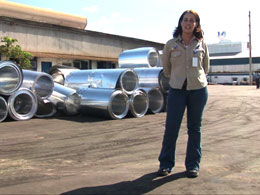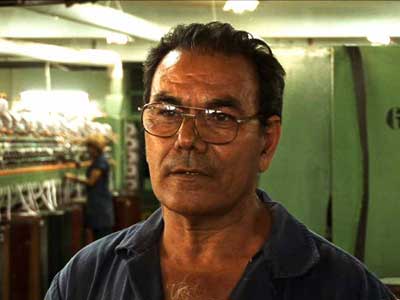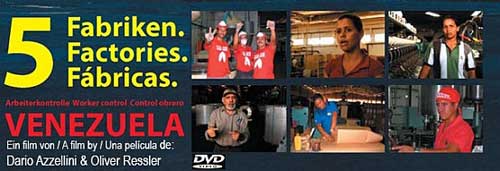Documentaries
5 Factories – documenting the struggle for workers' emancipation in Venezuela
- 18 July 2006
On January 19, 2005 Chavez signed the decree of expropriation of Venepal, the paper company based in Moron, and announced that it was going to be run by the workers themselves. Later on that year, another factory was expropriated, the CNV, a valve making factory in Los Teques, also to be run with the participation of the workers. More or less at the same time, Carlos Lanz was appointed as the director of Alcasa, a state-owned aluminium smelter in the state of Bolivar, and started to introduce workers' control.
These measures opened a very important debate within the Venezuelan workers' movement about workers' control and participation. Now a new film by Dario Azzellini and Oliver Ressler, 5 factories, documents the opinions of Venezuelan workers directly involved in this debate. Azzellini and Ressler are already familiar with the Bolivarian revolution, and are known for having put together Venezuela from below, another film in which the main characters are the ordinary working people of Venezuela, who are also the main protagonists of the revolution.
 "5 factories" documents the experiences of workers'
participation and control in 5 different factories, the aluminium smelter at
Alcasa, the tomato processing plant in Caigua, a chocolate factory, a textile
cooperative in Tachira and the paper mill in Carabobo, Invepal.
"5 factories" documents the experiences of workers'
participation and control in 5 different factories, the aluminium smelter at
Alcasa, the tomato processing plant in Caigua, a chocolate factory, a textile
cooperative in Tachira and the paper mill in Carabobo, Invepal.
Each one of these examples shows a different form of organisation and workers' participation. The workers themselves explain their own experience, their own struggle and their own aspirations. Machine operator Carmen Ortiz expresses their common perception that "Working collectively is much better than working for someone else - working for someone else is like being a slave to someone".
While the forms of organisation are different (workers' cooperative, workers' control, shared management with the state, etc), and the problems and difficulties they face are also different, there is one thing in common all the workers in the film have: they all see their struggle as part of the general struggle of the Bolivarian revolution, as part of the struggle to free themselves from the chains of exploitation.
All the workers the documentary gives a voice to also have a common goal: "socialism of the 21st century", of which president Hugo Chavez has spoken.
 The film was first presented in the form of an installation
at the Berkeley Art Museum as part of a series of
exhibitions under the common title of "Now-Time Venezuela",
organised by one of its curators, Chris Gilbert. This was an unusual exhibition
for an Art Museum, but Gilbert defended it boldy, arguing that culture must
take sides: "clearly there is a war taking place, a war against the poor (the
Fourth World War, to use the Zapatistas' description). In such circumstances,
it becomes incumbent upon all to choose sides between being agents of the
dominant class's power - for which culture provides a mask or smokescreen for
its property grabs and a celebration of its values (such as I would argue on
some level almost the whole of contemporary art has been reduced to) - or by
contrast aligning with processes of social transformation and counter-movement
that take shape under the names of anti-globalization, fight against capitalism,
or in this case Bolivarian Venezuela."
The film was first presented in the form of an installation
at the Berkeley Art Museum as part of a series of
exhibitions under the common title of "Now-Time Venezuela",
organised by one of its curators, Chris Gilbert. This was an unusual exhibition
for an Art Museum, but Gilbert defended it boldy, arguing that culture must
take sides: "clearly there is a war taking place, a war against the poor (the
Fourth World War, to use the Zapatistas' description). In such circumstances,
it becomes incumbent upon all to choose sides between being agents of the
dominant class's power - for which culture provides a mask or smokescreen for
its property grabs and a celebration of its values (such as I would argue on
some level almost the whole of contemporary art has been reduced to) - or by
contrast aligning with processes of social transformation and counter-movement
that take shape under the names of anti-globalization, fight against capitalism,
or in this case Bolivarian Venezuela."
This devastating criticism of present day art won Chris a few enemies within the institution he was working for, and finally led to his resignation on May 21 this year. In his resignation letter he explained the pressure he was under to abandon his approach. "The museum administrators - meaning the deputy directors and senior curator collaborating, of course, with the public relations and audience development staff - have for some time been insisting that I take the idea of solidarity, revolutionary solidarity, out of the cycle. For some months, they have said they wanted "neutrality" and "balance" whereas I have always said that instead my approach is about commitment, support, and alignment - in brief, taking sides with and promoting revolution."
And he ended his resignation letter with a powerful appeal to action: "One should have no illusions: until capitalism and imperialism are brought down, cultural institutions will go on being, in their primary role, lapdogs of a system that spreads misery and death to people everywhere on the planet. The fight to abolish that system completely and build one based on socialism must remain our exclusive and constant focus."
This is therefore a very interesting film because it shows the living voice of the Venezuelan workers who are directly involved in these debates. "5 factories" does not pretend to give any answers. It simply relays the questions faced by the Venezuelan workers' movement.
The British premiere of "5 factories", organised by the Hands Off Venezuela campaign, will take place on Wednesday, July 19, at the Inn on the Green, Thorpe Close, Portobello Green (nearest tube Ladbroke Grove). Click here for more information.
The film, in the Spanish original with subtitles in English, German and French can be bought from Docushop.
